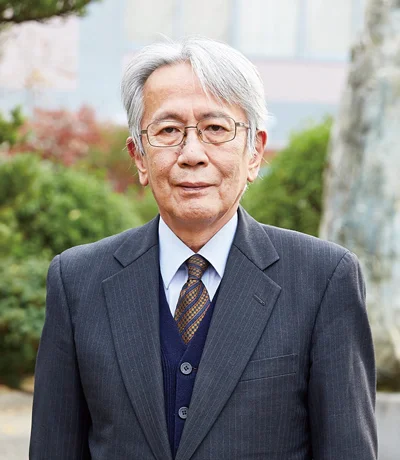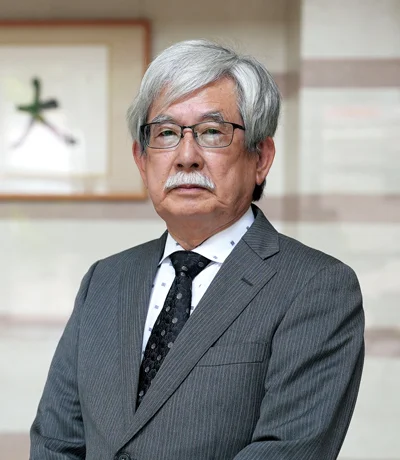Message
Message from the Chief Director of the University

Tatsuhito Kawasaki, M.D., Ph.D.
President,
Medical Corporation Kawasakikai Superintendent,
Mizuma Hospital President,
Social Medical Corporation Kenjinkai Dean,
Kawasaki Nursing College
Nurture Medical Professionals with a Rich Sense of Humanity Based on the Founding Spirit of "Dreams and Great Compassion”
Osaka Kawasaki Rehabilitation University (OKRU) was founded in 2006 with the founding spirit of "Dreams and Great Compassion" as its guiding philosophy.
Our goal is to nurture medical professionals who have dreams and aspirations, and who are capable of understanding and showing compassion for pain, sorrow, and suffering of others, and who are equipped with rich human qualities.
In rapidly aging society, active rehabilitation in terms of both targeted treatment and holistic care is becoming increasingly important, and the demand for physical therapists, occupational therapists, and speech-language therapists is increasing.
We therefore believe it is necessary to train high quality medical professionals in this field. In turn, we hope to contribute our knowledge, skills, and research to the improvement of health, medical care, and welfare, and to give back to society so that we can heal sick and physically impaired individuals and support those who support them.
We have established an environment where students can learn the three areas essential for rehabilitation in the lush greenery of the Mizuma area.
Moreover, we have created a cooperative professional environment for learning team medicine in partnership with the Kawasaki Group, core hospitals, and a wide range of clinical training facilities.
We hope that our students will become medical professionals who can heal patients not only technically but also spiritually.
Message from the University President

Masatoshi Takeda, M.D., Ph.D.
Dean/ Director, Cognitive Reserve Research Center
OKRU; Aiming for the Goal of Realizing Useful Rehabilitation
Needed from the Society by Fostering
Excellent and Kind-hearted Therapists
Osaka Kawasaki Rehabilitation University (OKRU) is committed to educating three types of nationally-qualified rehabilitation professionals (physical therapists, occupational therapists, and speech-language pathologists), one of only four educational institutions in Osaka Prefecture to do so.
The university was established in 2006 as the first in Japan to include 'rehabilitation' in its name, and has been sending out rehabilitation specialists for more than 20 years.
Many of our graduates are active as rehabilitation professionals at nearby medical, nursing, and welfare facilities.
As society ages, the need for rehabilitation professionals will continue to increase. We hope to continue to nurture 'excellent and kind-hearted rehabilitation therapists' who can be close to and support people with disabilities or impairments, including elderly people.
OKRU is a small university specialized in rehabilitation science, and all faculty members work with the goal of passing down the message of the importance of rehabilitation and the latest knowledge and techniques to the younger generation.
I hope that many young people will study rehabilitation and go on to make contributions to society.
BIOSKETCH of Prof. Masatoshi Takeda
-
1983
Graduated from Graduate School of Medicine, Osaka University, MD, PhD.
-
1984
Research Assistant, Department of Psychiatry, Osaka University
-
1985-1987
Research Fellow at University of Florida and Baylor College of Medicine, USA
-
1991
Assistant Professor, Department of Psychiatry, Osaka University
-
1996
Chairman Professor, Department of Psychiatry, Osaka University
-
2015
President, Aino University
-
2018
Director, Cognitive Reserve Research Center, OKRU
-
2020
President, OKRU
Masatoshi Takeda, MD, PhD, served as the chairman professor of psychiatry, Osaka University, one of the oldest and most influential psychiatry departments in Japan, between 1996 and 2015. As a Professor Emeritus of Osaka University, he now serves as the President and Director of the Cognitive Reserve Research Center of Osaka Kawasaki Rehabilitation University.
He has been engaged with biological psychiatry research at Osaka University, the University of Florida, and Baylor Medical School in Texas. With his background of neurochemistry, molecular genetics, and cell biology, his research covers basic to clinical psychiatry of major psychiatric disorders including dementia. He has published over 400 original papers in English, and over 900 papers in psychogeriatrics, biological psychiatry, and clinical psychiatry. Recent research interest covers molecular biology of Alzheimer' s disease, the clinicopathology of schizophrenia, and cognitive impairment in psychiatric disorders including cognitive reserve of elderly individuals.
Professor Takeda previously served as the President of the Japanese Society of Psychiatry and Neurology (JSPN), the President of the Japanese Society of Biological Psychiatry (JSBP), the President of the World Federation of Societies of Biological Psychiatry (WFSBP) and the President of the International Psychogeriatric Association (IPA).
He was involved with the journals as the Editor-in-Chief of many journals, including Psychogeriatrics (the official journal of the Japanese Psychogeriatric Society), Psychiatry and Clinical Neurosciences (the official journal of JSPN), Japanese Journal of Psychiatry and Neurology, Dementia Japan (the official journal of the Japan Society of Dementia Research), Cognition and Dementia, and Schizophrenia Frontier.
- Presenilin-1 mutations downregulate the signaling pathway of the unfolded-protein response. Nature Cell Biology , 1(8) : 479-485, 1999
- Medial prefrontal cortex generates frontal midline theta rhythm.Neuroreport , 10(4) : 675-679, 1999
- Presenilin-dependent intramembrane proteolysis of CD44 leads to the liberation of its intracellular domain and the secretion of an Aβ-like peptide.Journal of Biolo gical Chemistry 277(47) :44754-44759, 2002
- Presenilins mediate a dual intramembranous γ‐secretase cleavage of Notch‐1.The EMBO journal , 21(20) : 5408-5416, 2002
- A molecular chaperone inducer protects neurons from ER stress1.Cell Death & Differentiation, 15(2) : 364-375 , 2008
- Disturbed activation of endoplasmic reticulum stress transducer s by familial Alzheimer's disease-linked presenilin-1 mutations.Journal of Biological Chemistry, 276(46) : 43446-43454 ,2001
- A novel protein, RTN-XS, interacts with both Bcl-XL and Bcl-2 o n endoplasmic reticulum and reduces their anti-apoptotic activity. Oncogene , 19(50) : 5736-5742, 2000
- The glutamatergic system and neurodegeneration in dementia: preventive strategies in Alzheimer's disease.International Journal of Geriatric Psychiatry , 14(1) : 3-47 , 1999
- The DYRK1A gene, encoded in chromosome 21 Down syndrome critical region, bridges between β -amyloid production and tau phosphorylation in Alzheimer diseas e.Human Molecular Genetics ,16(1) : 15-23 , 2006